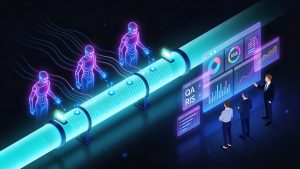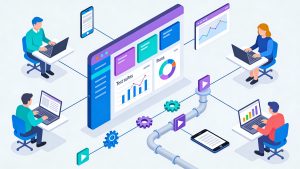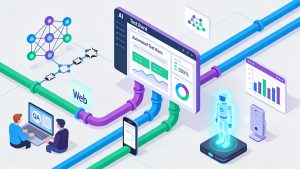DevOps has transformed the software development landscape by fostering collaboration between development and IT operations teams through automation and streamlined processes. For quality assurance (QA) engineers, the inherent curiosity, adaptability, and understanding of the software development lifecycle make them well-suited to adopt DevOps principles. This article explores how QA professionals can transition into DevOps roles, the skills they need to develop, and the mindset required to thrive in this evolving domain.
Understanding DevOps and Its Relevance to QA Engineers
DevOps is defined as a methodology that integrates and automates tasks between development and IT operations teams. It emphasizes communication, collaboration, and shared responsibility to enable faster and more efficient software delivery. According to Nedko Hristov, a quality assurance engineer with experience in DevOps, QA professionals are uniquely positioned to excel in this field due to their foundational knowledge of software testing and development.
Hristov explains that while DevOps is not typically an entry-level role, QA engineers already possess many of the skills required to succeed. Their familiarity with coding principles, deployment processes, and system architectures provides a strong starting point for understanding the core concepts of DevOps.
Why QA Engineers Are Suited for DevOps
QA engineers bring several key traits to the table that align well with DevOps principles:
1. Curiosity and Proactive Learning
QA professionals are naturally curious and driven to expand their knowledge base. Hristov recalls his own journey into DevOps, where he actively sought out developers to understand system behavior, troubleshooting techniques, and the root causes of failures. This proactive approach enables QA engineers to bridge knowledge gaps and adapt quickly to new technologies.
2. Adaptability
The tech landscape is constantly evolving, requiring professionals to stay updated on emerging tools and practices. Hristov emphasizes that adaptability is one of the most crucial skills for success in DevOps. By identifying key concepts and focusing on practical applications, QA engineers can efficiently acquire the knowledge needed for specific tasks.
3. Foundational Knowledge
While deep expertise in every technology is not necessary, a solid understanding of fundamental principles is essential. QA engineers often have experience with automation tools and testing frameworks, which provides a strong foundation for transitioning into DevOps roles.
Approaching Failures as Growth Opportunities
Failures are an inevitable part of any professional journey, but they offer invaluable learning opportunities when approached constructively. Hristov highlights three key questions that can help professionals analyze failures effectively:
- What happened? Objectively assess the events leading up to the failure.
- Why did it happen? Identify the root cause and contributing factors.
- What is my takeaway? Extract lessons learned and apply them to future scenarios.
Hristov advises adopting a growth mindset when dealing with failures. He consistently reminds his mentees that failure is not inherently negative but rather an essential component of professional development. By learning from mistakes, QA engineers can refine their skills and improve their working practices over time.
Key Skills for Thriving in a DevOps Role
To successfully transition into a DevOps role, QA engineers should focus on developing the following skills:
1. Communication
Effective communication is critical in a collaborative environment like DevOps. Hristov emphasizes the importance of asking insightful questions to gain a deeper understanding of new technologies or processes.
2. Problem-Solving
When encountering new tools or challenges, QA engineers should ask themselves questions such as:
- What problem does this technology solve?
- How does it integrate with existing workflows?
- What are its best practices or common pitfalls?
This analytical approach helps professionals navigate complex systems more effectively.
3. Incremental Improvement
One of Hristov’s key takeaways from his DevOps journey is the importance of focusing on incremental improvements rather than chasing perfection. Early in his career, he often aimed for flawless solutions from the outset—a mindset that led to delays and frustration. Instead, he now prioritizes delivering value quickly and refining solutions over time.
Lessons Learned from Applying DevOps Principles
Hristov shares several insights from his experience as a QA engineer transitioning into DevOps:
- Avoid Perfectionism: Focus on addressing critical pain points rather than trying to optimize every aspect immediately.
- Iterative Development: Deliver value incrementally by breaking down complex problems into manageable tasks.
- Understand Business Needs: Align technical solutions with core business objectives to maximize impact.
If given the chance to start over, Hristov would prioritize understanding business requirements early on instead of getting caught up in technical perfectionism.
The Path Forward for QA Engineers in DevOps
As organizations increasingly adopt DevOps practices, there is a growing demand for professionals who can bridge the gap between development and IT operations teams. QA engineers are uniquely positioned to fill this role due to their expertise in testing methodologies and their ability to adapt quickly to new challenges.
By leveraging their curiosity, adaptability, and foundational knowledge of software development processes, QA professionals can transition into rewarding careers in DevOps. With a constructive approach to failures and a focus on continuous learning, they can thrive in this dynamic field while contributing significantly to their organizations’ success.
Conclusion
The integration of DevOps principles into quality assurance practices offers immense opportunities for career growth. By embracing adaptability, fostering collaboration, and focusing on incremental improvements, QA engineers can successfully transition into DevOps roles while driving innovation in software delivery processes.
As Nedko Hristov’s journey demonstrates, curiosity and a proactive approach are key drivers of success in this field. For QA professionals looking to expand their horizons, adopting DevOps principles could be the next step toward achieving greater impact and professional fulfillment.
Read more such articles from our Newsletter here.



